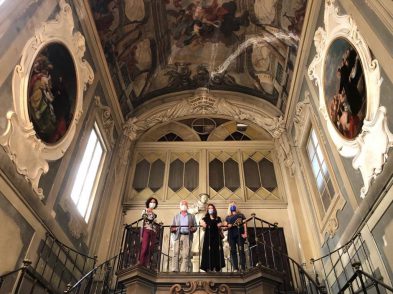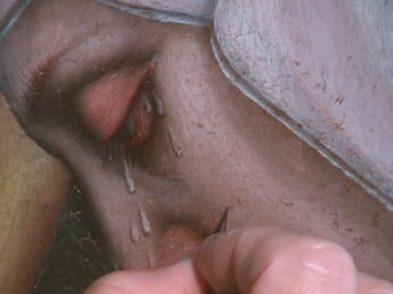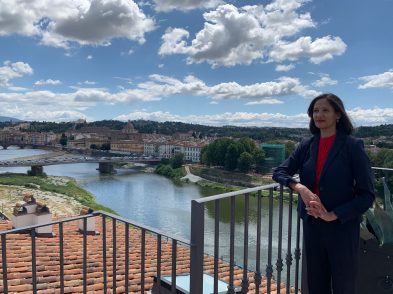Sitting on the terrace in Chianti, happy as a clam, I was enjoying my first meal al fresco in eight months. It was my friend Edoardo’s birthday, and the spring air was crisp and the company warm. Then suddenly the winds changed.
“So, the government has fallen at last,” Edoardo announced between slices of pear and parmigiano. He said it with as much indifference as an Italian can muster, and it was received with as much apathy as his dinner guests could feign.
“Finally!” his wife mused, without looking away from the fruit cups she was serving.
“They made you a good birthday gift, amico mio,” our friend Ruggero joked. “This year you don’t have to wish Berlusconi away with your birthday candles. It seems that he will be going away himself!”
There was laughter everywhere.
Italians face political turnover with unnerving nonchalance. Most are convinced that taxes and bureaucracy will stand strong whether thegovernment falls, rolls over, playsdead, or gets back up when no one is looking to pour itself a cup of coffee. I, of course, was the only one who was concerned. I come from a country where governments don’t just fall between the second and third course of a meal. And although I could appreciate the unfailing Italian ability to good- naturedly adapt to new situations, I found my friends’ reaction a bit worrisome. Like it or not, hadn’t Berlusconi been elected by the people? In a respectable democracy shouldn’t the prime minister be able to fulfill the five-year term guaranteed him by the Constitution? What would the failure of his government mean to Italian politics? What would it mean to me as a citizen?
While I silently wrestled with democratic principles and the modern world, the topic of conversation moved to football. Mamma mia! Being served our first strawberries of the season had kept the group’s attention for longer than the governmental crisis. And there was no doubt that La Fiorentina’s match Juventus the night before was weighing more on people’s minds. Apparently the violet team’s loss was more essential to Florentine well-being than the loss of a prime minister. And al fresco or not, I found the situation a bit infuriating.
Edoardo’s wife, Silvia, who is good at reading people’s minds, saw something in my expression that invited her to explain. “Over the past fifty years, we’ve had forty governments and no change. It’s like choosing the kind of gelato you want, except all the flavours taste the same. When il Parlamento feels the Prime Minister’s not doing an acceptable job, they give him a voto di mancanza di fiducia, lack of faith vote, which often means he’s forced to step down. It’s a loophole in the system created to protect Italy from another Mussolini. It’s foreseen in our system. Most times they just piece things back together like in that rhyme of the egg that had a great fall.”
“But doesn’t it matter to you?” I asked. “If the government fell like that in the U.S., citizens would suddenly feel very vulnerable and lost. Half the population would end up having to go to Tahiti to find themselves.”
“Well,” Silvia laughed, “then they are likely to find our politicians there. Several fl ed to tropical islands after the Tangentopoli corruption scandals in ‘92. Those were hard times for Italy. Many politicians ended their careers that year, either in jail or by suicide. Quite a few left the country and became beach bums. But most of the real bums are still running the country. In Italy, la politica è cosa sporca. Politics is a dirty thing.”
Silvia’s statement got the rest ofthe group talking government again – mostly because Italians never miss an opportunity to express their inborn cynicism. Yes, that’s right, cynicism. Despite the happy-golucky image they often project to the world, never let their faux optimismfool you. Deep down Italians are invariably fatalists. It might not seem so at fi rst glance, but in the end, for Italians, it is about the inevitability of death and taxes.
After most of the guests had gone, my host slung a lazy arm around my shoulders, “Still thinking politica?”
I nodded. “Sorry to beat a dead horse, but I just don’t understand what will happen now that the government has fallen.”
Edoardo stifled a smile. “Unfortunately, nothing. But if it worries you, have faith. Berlusconi will be back again tomorrow.”
And indeed he was. It took a little over a week and then all the king’s horses
And all the king’s men properly patched up poor Humpty.







